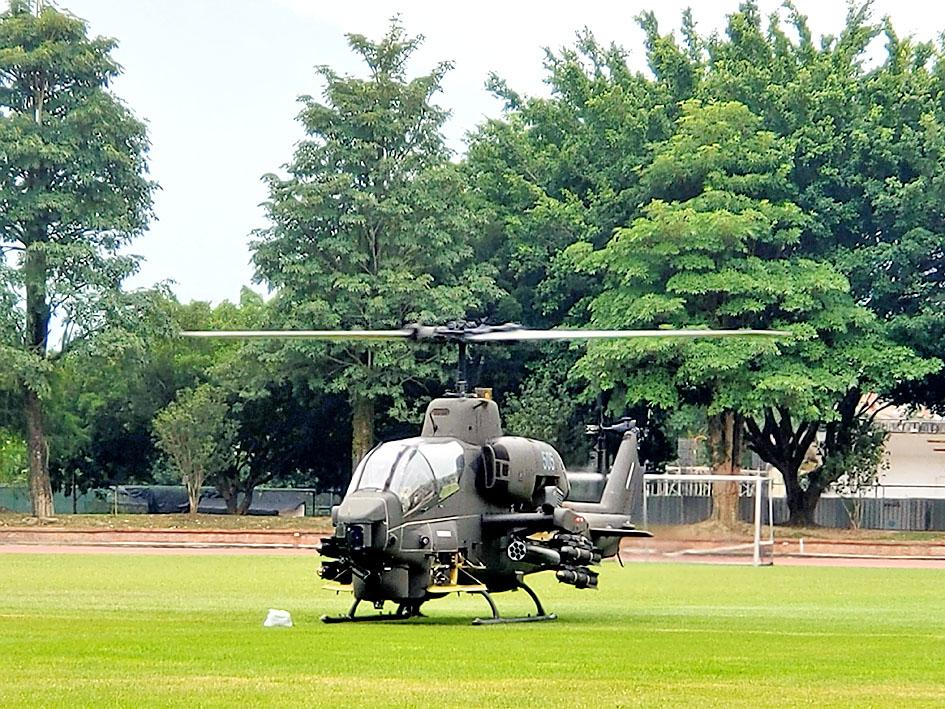The Ministry of National Defense has signed a NT$339.24 million (US$11.91 million) contract with the US to maintain the army’s Bell AH-1W SuperCobra attack helicopters, public information on the government’s procurement platform showed.
The contract was signed by a military delegation and the American Institute in Taiwan to secure spare parts and technical support for the army’s AH-1Ws until Sept. 30, 2027, an official said yesterday on condition of anonymity.
The military is replacing the AH-1W with the AH-1Z Viper, but is concerned over potential safety issues such structural aging, even though the legacy fleet’s operational readiness is satisfactory, the official said.

Photo: Tung Chen-kuo, Taipei Times
Some parts are no longer manufactured since the US Marine Corp decommissioned its last AH-1W in October last year, the official said.
Taiwan bought a three-and-a-half year supply of parts for NT$1.46 billion in 2019, which would last until the middle of next year, the official said.
Taiwan bought 42 AH-1Ws in 1992 and another batch of 21 in 1997, although two aircraft were lost due to accidents.
The AH-1Ws are deployed by two attack helicopter squadrons of the 602nd Air Cavalry Brigade.

Taiwan is stepping up plans to create self-sufficient supply chains for combat drones and increase foreign orders from the US to counter China’s numerical superiority, a defense official said on Saturday. Commenting on condition of anonymity, the official said the nation’s armed forces are in agreement with US Admiral Samuel Paparo’s assessment that Taiwan’s military must be prepared to turn the nation’s waters into a “hellscape” for the Chinese People’s Liberation Army (PLA). Paparo, the commander of the US Indo-Pacific Command, reiterated the concept during a Congressional hearing in Washington on Wednesday. He first coined the term in a security conference last

Prosecutors today declined to say who was questioned regarding alleged forgery on petitions to recall Democratic Progressive Party (DPP) legislators, after Chinese-language media earlier reported that members of the Chinese Nationalist Party (KMT) Youth League were brought in for questioning. The Ministry of Justice Investigation Bureau confirmed that two people had been questioned, but did not disclose any further information about the ongoing investigation. KMT Youth League members Lee Hsiao-liang (李孝亮) and Liu Szu-yin (劉思吟) — who are leading the effort to recall DPP caucus chief executive Rosalia Wu (吳思瑤) and Legislator Wu Pei-yi (吳沛憶) — both posted on Facebook saying: “I

Sung Chien-liang (宋建樑), who led efforts to recall Democratic Progressive Party (DPP) Legislator Lee Kun-cheng (李坤城), was released on bail of NT$80,000 today amid outcry over his decision to wear a Nazi armband to questioning the night before. Sung arrived at the New Taipei District Prosecutors’ Office for questioning in a recall petition forgery case last night wearing a red armband bearing a swastika, carrying a copy of Adolf Hitler’s Mein Kampf and giving a Nazi salute. Sung left the building at 1:15am without the armband and covering the book with his coat. Lee said today that this is a serious

A mountain blaze that broke out yesterday morning in Yangmingshan National Park was put out after five hours, following multi agency efforts involving dozens of fire trucks and helicopter water drops. The fire might have been sparked by an air quality sensor operated by the National Center for High-Performance Computing, one of the national-level laboratories under the National Applied Research Laboratories, Yangmingshan National Park Headquarters said. The Taipei City Fire Department said the fire, which broke out at about 11am yesterday near the mountainous Xiaoyoukeng (小油坑) Recreation Area was extinguished at 4:32pm. It had initially dispatched 72 personnel in four command vehicles, 16